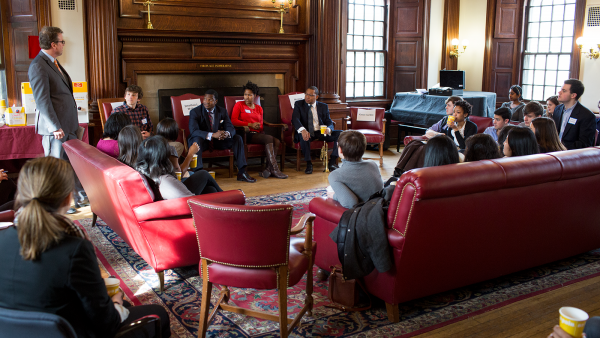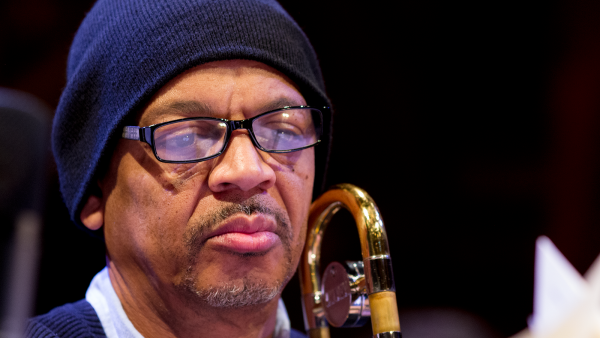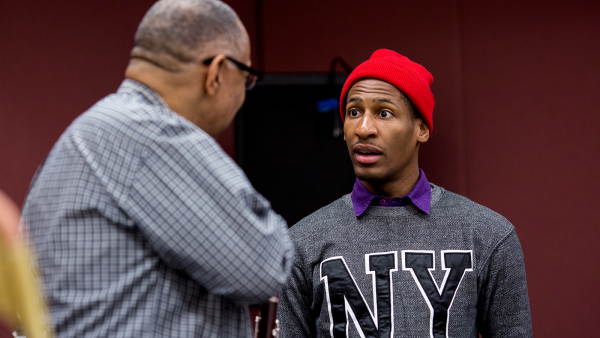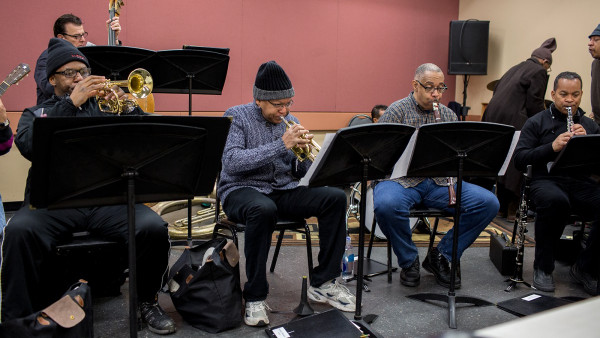Wynton Marsalis to conclude lecture-performance series at Harvard University
Wynton Marsalis will conclude his six-lecture series at Sanders Theater on January 30 with a lecture performance focusing on New Orleans and the birth of Jazz. Currently the Managing and Artistic Director of Jazz at Lincoln Center, Marsalis is an acclaimed musician, composer, bandleader, educator, and advocate for the arts.
Marsalis’ lecture, “New Orleans: The Birth of Jazz” will cover a significant portion of the wide cross-section of musical styles that constitute the roots of Jazz. Marsalis will illuminate the music’s identity by examining its repertoire, functions, venues and most significant musical figures, chief amongst them, Buddy Bolden, the legendary “First Man of Jazz.” Joining Marsalis are: Lucien Barbarin (trombone), Jonathan Batiste (piano), Troy Davis (drums), Vince Giordano (tuba/bass), Victor Goines (reeds), Ricky Gordon (percussion), Marcus Printup (cornet), Don Vappie (banjo/guitar), and Dr. Michael White (clarinet)
The lecture will begin at 7 p.m. and will be live streamed at Harvard.edu/livestream
“New Orleans between 1885 and 1910 was a place like no other,” Marsalis said. “Here, amid a diversity of people, philosophies and possibilities, jazz was born. Conceived in a city that still has a statue of the losing Confederate General as its central landmark, Jazz has proven to be the most definitive artistic symbol of American democracy. “
Marsalis’ lecture series, “Hidden in Plain View: Meanings in American Music,” is sponsored by the Office of the President and the Office of the Provost. The series launched in April 2011 before a capacity crowd with “Music as Metaphor,” a two-hour journey through the history of American music, punctuated with performances by bluegrass and jazz musicians. He returned to campus in September 2011 with a team of dancers for his second lecture, “The Double Crossing of a Pair of Heels: The Dynamics of Social Dance and American Popular Musics,” which traced the evolution of American social dance from the Charleston to the fox trot and the tango to the twist. His third lecture, “Meet Me at the Crossroad,” in February 2012 examined the roots of American music, while his fourth lecture in April 2013, “At the Speed of Instinct: Choosing Together to Play and Stay Together,” examined the art of improvisation. He returned to campus in September 2013 for “Setting the Communal Table: The Evolution of the Jazz Orchestra”, a lecture on the history of orchestral jazz featuring the Jazz at Lincoln Center Orchestra.
“Wynton Marsalis is an inspiring and powerful educator,” Harvard President Drew Faust said. “Through his series of lecture-performances, he has illuminated the past and illustrated the many ways in which music connects us to one another across time and space. Each of his appearances has been a gift to our community, and I am thrilled to welcome him back to Harvard.”
In addition to his lectures, Marsalis has engaged in dialogue with students throughout the University and community, taught master classes at a local high school, engaged in a panel discussion about education and the arts at the Graduate School of Education, and spoke at the Harvard Innovation Lab about the artist as an entrepreneur.
A native of New Orleans, Marsalis is one of the nation’s most highly decorated cultural figures. In addition to winning nine Grammy Awards, he was the first jazz musician to receive the Pulitzer Prize for music for his oratorio Blood on the Fields.
His international accolades include honorary membership in Britain’s Royal Academy of Music, the highest decoration for someone not a British citizen, and the insignia Chevalier of the Legion of Honor, France’s highest distinction. He has more than 70 albums to his credit, which have sold more than 7 million copies, including three gold records.
Marsalis is the first major jazz artist to perform and compose across the full spectrum of jazz, from its New Orleans roots to bebop and modern jazz. He has expanded the vocabulary of jazz by creating an expansive range of music for everything from quartets to big bands and symphony orchestras, and tap dance to ballet and modern dance. He was recently named a CBS News Cultural Correspondent. Harvard awarded him an honorary doctorate in music in 2009.
Tickets for Marsalis’ lecture at Sanders will be free. They will become available for the Harvard community on January 28 and for the public on January 29. For information on obtaining tickets, visit the Harvard Box Office website.





Comments
MTSCR
MTSCR on Jan 31st, 2014 at 4:57pm
Same question if someone will answer. I would like to watch previous lectures that I’ve missed.
Cynthia Toomer on Jan 31st, 2014 at 2:59pm
Will it be available to watch later? I gotta show that to my nephews!
Israel Williams on Jan 31st, 2014 at 10:40am
What a great lecture! Will the video be archived and saved somewhere, so I can watch it again and again? Thank you, Wynton and the other musicians, for all your efforts in bringing this wonderful music to life and educating us about it!
Yana on Jan 30th, 2014 at 10:51pm
What a great lecture! Will the video be archived and saved somewhere, so I can watch it again and again? Thank you, Wynton and other musicians, for all your efforts in bringing this wonderful music to life and educating us about it!
Yana on Jan 30th, 2014 at 10:50pm
Pity, cant connect…dont know why….. I keep on trying again and again….well..patience.
Wynton rules in Harvard …..and everywhere…..of course.
All the best
MTSCR
MTSCR on Jan 30th, 2014 at 7:59pm
“Conceived in a city that still has a statue of the losing Confederate general as its central landmark…”
If Wynton is referring to the statue in New Orleans’s Jackson Square, that would be Andrew Jackson, hero of the Battle of New Orleans, not Stonewall Jackson, losing Confederate general (who wasn’t alive when Lee threw in the towel).
Richard Sanders on Jan 28th, 2014 at 3:18pm